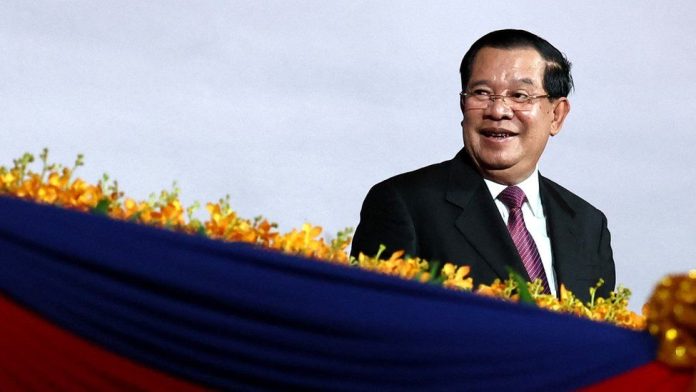Phnom Penh, Cambodian Prime Minister Hun Sen kicked off a three-week election campaign on Saturday, with his party poised to sweep the one-sided contest after the top challenger was barred from taking part.
Cambodians will vote on July 23 in an election widely seen as a sham after authorities denied registration to the Candlelight Party — considered the only viable rival to Hun Sen’s Cambodian People’s Party.
Hun Sen — who has ruled Cambodia for 38 years — told a sea of tens of thousands of supporters dressed in party T-shirts and hats that his government would build more roads and schools while boosting wages and economic growth.
He also vowed to eradicate “hostile circles seeking to incite national division, social chaos and political instability”.
“If the Cambodian People’s Party wins, the Cambodian people are the winners,” he told the crowd.
Hun Sen — one of the world’s longest-serving leaders — has hinted he will retire in the near future.
He has backed his eldest son Hun Manet, a four-star general, to succeed him.
At Saturday’s rally, he handed the party’s flag to Hun Manet, who led a convoy of scooters, cars and banner-festooned trucks carrying musical performers on a procession through Phnom Penh’s streets.
Party supporter Yin Linda said she hoped Hun Manet, who was educated in Britain and the United States, would “bring new ideas from overseas to develop our country’s prosperity”.
But a tuk-tuk driver who didn’t want to be named characterised the election as “meaningless” and said that opposition supporters were deeply unhappy with the state of Cambodian politics.
“The international community will not accept the results,” the 50-year-old said.
Hun Sen’s party won every seat in the 2018 national election after a court dissolved the opposition Cambodia National Rescue Party.
Human Rights Watch’s Asia Division deputy director Phil Robertson dismissed the election campaign as “Hun Sen going through the motions… claiming that this is democracy in action”.
“When in reality he’s done everything possible to make sure he faces no real opposition whatsoever,” Robertson added.
“It’s a stab in the back to the people of Cambodia. They don’t have a choice. It’s more of the same.”
Cambodia’s parliament last week approved laws to ban anyone who fails to vote in this year’s poll from running for office in future elections — a move that will affect Hun Sen’s exiled rivals.
On the eve of the election campaign, Hun Sen, a prolific Facebook user, quit the platform ahead of its parent company Meta announcing it would remove one of his videos and was considering a recommendation to suspend his account.
The video, filmed in January, showed Hun Sen threatening his opponents with legal action or a beating if they accused his party of vote theft in July’s polls.
The ruling on the video by Meta’s Oversight Board said his speech contained “unequivocal statements of intent to commit violence” against opposition politicians.
Analysts say that China’s political and financial support has emboldened Hun Sen’s unprecedented crackdown on political activists, the media and civil society — an assault spurred by major opposition gains in previous elections.
Rights groups accuse Hun Sen of using the legal system to crush any opposition, and scores of political opponents have been convicted during his time in power.
Opposition leader Kem Sokha was sentenced in March to 27 years in prison and placed under house arrest for treason over an alleged plot with foreigners to topple Hun Sen’s government.
Another opposition figure, Sam Rainsy, has been living in exile in France since 2015 to avoid prison for convictions he says are politically motivated.

















